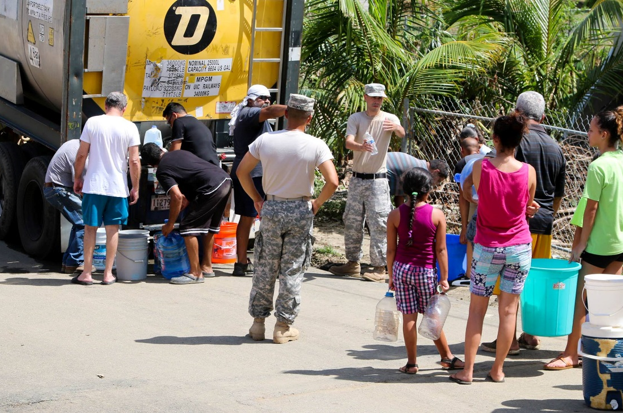
Four Years Ago Puerto Rico Warned of “Climate Tipping Points” – Did Anyone Listen?
Scientists have been warning about the risk to Puerto Rica from climate change for years, but was anyone listening?
So this is what climate change looks like. One week on from when Hurricane Maria hit the island, Puerto Rico is facing a humanitarian crisis.
Some 97% of the island’s 3.4 million residents are still without power. About half of the Island’s residents do not have running water. And no one knows when things will be fixed.
The situation is made worse by rising daily temperatures, threatening to increase the spread of water-borne diseases.
Carmen Yulín Cruz, the Mayor of San Juan, the capital of Puerto Rico said bluntly: “People are dying. This is the reality that we live in, the crude aftermath of a storm, a hurricane that has left us practically paralyzed.”
Scientists have been warning about the risk to Puerto Rica from climate change for years, but was anyone listening? Four years ago, the Puerto Rico Climate Change Council, warned in a report on the subject of global warming that: “Puerto Rico’s population reflects high levels of vulnerability to hazards.”
The report concluded with a prediction for the future that has come to pass all too quickly:
“Temperatures are increasing, precipitation patterns are changing, extreme events are occurring more frequently, oceans are more acidic, and sea level is rising. These climatic changes are projected to occur at much faster than natural rates. Some types of extreme weather and climate events have already increased in frequency and intensity and these changes are projected to continue.”
It continued: “Climate changes are already affecting some aspects of society, the economy and natural ecosystems of Puerto Rico and these effects are expected to increase. Not all of these changes will be gradual.”
And finally said: “When certain tipping points are crossed, impacts can increase dramatically. Past climate is no longer a reliable guide to the future. This affects planning for public and private infrastructure, tourism and industry, water resources, energy and all other social and economic systems”.
But nothing was done. The warnings went unheeded.
Many people believe that the recent Hurricanes we have witnessed in the Caribbean and US maybe evidence that the climate change “tipping point” is here. The future people worried about has arrived.
The time to act is now. Instead we have a climate denying President in the White House who is coming under increasing pressure to not only act on climate but to act to help those in Puerto Rico.
On Monday, the creator of “Hamilton”, Lin-Manuel Miranda, tweeted at Trump that “there will be a lot of American deaths on your watch” if additional aid is not sent very soon.
But Trump not only denies climate change, but basic human rights too. Yesterday the Trump Administration turned down a request to waive shipping restrictions, known as the Jones Act, to help get fuel and supplies to Puerto Rico.
Even senior republicans have criticised this. Senator John McCain (R-Ariz.) said “it is unacceptable to force the people of Puerto Rico to pay at least twice as much for food, clean drinking water, supplies and infrastructure due to Jones Act requirements as they work to recover from this disaster.”
With no power, no water and even no homes, many people have no option but to leave for the US mainland. Yesterday. Puerto Rico Governor, Ricardo Rossello, warned that without “unprecedented relief” from the US government, “thousands if not millions” of residents could leave the island for the mainland in the coming days and weeks.
They are climate refugees and they could be soon heading to major US cities in their thousands.
As Bloomberg notes today: “Hurricane Maria’s devastation of Puerto Rico may offer a preview for Americans of one of the most jarring potential consequences of global warming: the movement of large numbers of people pushed out of their homes by the effects of climate change.”
Bloomberg quotes the International Monetary Fund, which released a report today examining the links between extreme weather and emigration in over 100 countries over three decades. According to Petia Topalova, the lead author of the report, the IMF found “a rise in temperature and greater incidence of weather-related disasters increase out-migration.”
That is exactly what is happening in Puerto Rico. Next week, Donald Trump will visit the island, some two weeks into the disaster.
For many his visit will be too little, too late. He should have listened to the warnings from the experts’ years ago.

